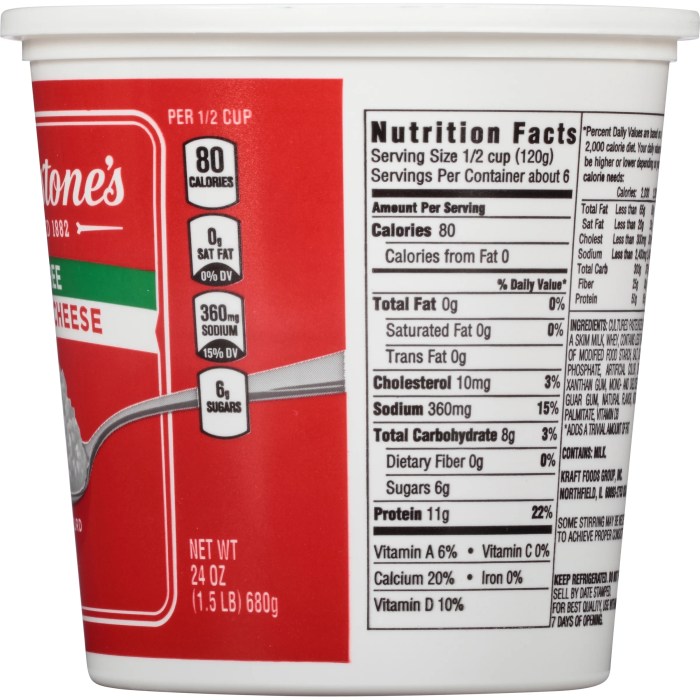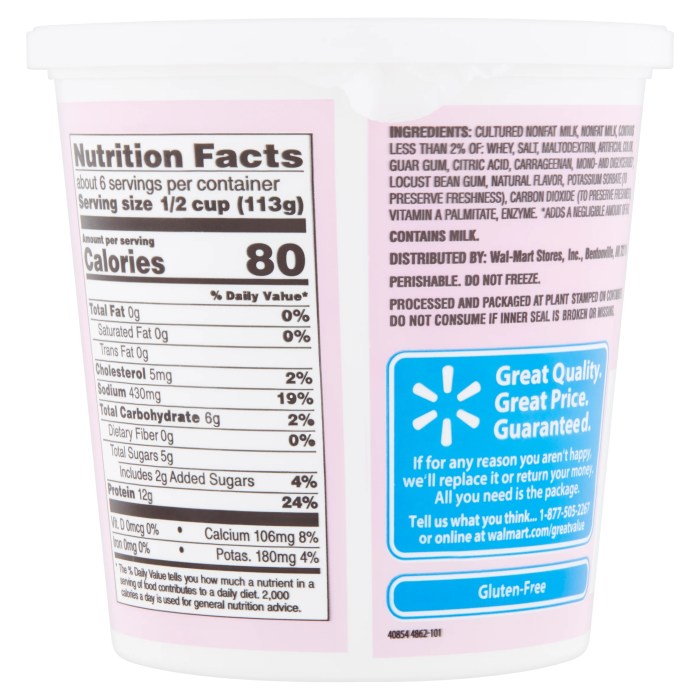Health Benefits of Consuming No Fat Cottage Cheese: No Fat Cottage Cheese Nutrition

No fat cottage cheese nutrition – No-fat cottage cheese offers a compelling nutritional profile, particularly beneficial for those seeking to manage their weight and improve overall health. Its combination of high protein and low fat makes it a versatile and powerful tool in achieving dietary goals. The following sections detail some key health advantages associated with its regular consumption.
The purported health benefits of no-fat cottage cheese often clash with the reality of its processed nature. A stark contrast is presented when comparing this to the nutritional profile of processed convenience foods, such as the alarmingly high sodium and saturated fat content readily available in the mac and cheese nutrition facts kraft data. Ultimately, both highlight the deceptive marketing of “healthy” options within the food industry, leaving consumers to navigate a minefield of misleading labels and nutritional information regarding no-fat cottage cheese and similar products.
Weight Management with No-Fat Cottage Cheese
No-fat cottage cheese is a cornerstone of many weight-management diets due to its high protein content and low caloric density. Protein promotes satiety, meaning it helps you feel fuller for longer, reducing overall calorie intake. Compared to higher-fat dairy options, no-fat cottage cheese provides a similar protein boost with significantly fewer calories, contributing to a calorie deficit necessary for weight loss.
For example, a half-cup serving of no-fat cottage cheese contains roughly 80 calories and 14 grams of protein, making it a satisfying and relatively low-calorie snack or meal component. This helps individuals manage their appetite and avoid overeating.
No-Fat Cottage Cheese and Satiety
The high protein content in no-fat cottage cheese plays a crucial role in promoting satiety. Protein takes longer to digest than carbohydrates or fats, leading to a prolonged feeling of fullness. This extended satiety effect helps curb cravings and reduces the likelihood of snacking between meals. Studies have shown that diets rich in protein are more effective for weight loss and maintenance, partly due to this satiating effect.
The casein protein found in cottage cheese is particularly slow-digesting, further enhancing its satiety properties.
No-Fat Cottage Cheese and Bone Health
No-fat cottage cheese is a good source of calcium, an essential mineral for maintaining strong and healthy bones. Calcium is vital for bone growth and density, particularly important throughout childhood and adolescence, and for preventing bone loss in older adults. Adequate calcium intake helps reduce the risk of osteoporosis and other bone-related diseases. While the calcium content may be slightly lower than in full-fat versions, the reduced fat content makes no-fat cottage cheese a healthier choice for individuals watching their fat intake while still benefiting from the calcium.
A serving of no-fat cottage cheese contributes significantly towards the recommended daily calcium intake.
No Fat Cottage Cheese in Different Diets

No-fat cottage cheese, a nutritional powerhouse, seamlessly integrates into diverse dietary approaches, offering versatility and health benefits. Its high protein content and low fat profile make it a valuable addition to various eating plans, enhancing both satiety and nutritional value. Understanding its adaptability allows for creative meal planning and sustained dietary adherence.
No-Fat Cottage Cheese in Low-Carb Diets, No fat cottage cheese nutrition
The low carbohydrate content of no-fat cottage cheese makes it an ideal choice for individuals following a low-carb diet. Its high protein keeps you feeling full, preventing cravings and promoting weight management. The following recipes showcase its versatility within this dietary framework.
- Cottage Cheese and Avocado Boats: Halve an avocado, remove the pit, and fill with a mixture of plain no-fat cottage cheese, chopped chives, and a squeeze of lime juice. This provides healthy fats and protein while remaining low in carbohydrates.
- Zucchini Noodles with Cottage Cheese and Pesto: Spiralize zucchini into noodles and toss with a mixture of no-fat cottage cheese, pesto (ensure it’s low-carb), and sun-dried tomatoes. This dish offers a refreshing, low-carb alternative to traditional pasta.
- Cottage Cheese and Spinach Omelet: Whisk eggs with a splash of milk and add a generous portion of no-fat cottage cheese and sautéed spinach. This provides a protein-rich, low-carb breakfast or brunch option.
No-Fat Cottage Cheese in High-Protein Diets
No-fat cottage cheese is a cornerstone of high-protein diets due to its impressive protein content per serving. This helps build and maintain muscle mass, crucial for individuals focused on strength training or overall fitness. Recipes below illustrate its role in protein-rich meals.
- Cottage Cheese Protein Pancakes: Combine no-fat cottage cheese with protein powder, eggs, and a touch of baking powder. Cook like regular pancakes for a high-protein breakfast option.
- Cottage Cheese and Chicken Salad: Mix shredded cooked chicken with no-fat cottage cheese, celery, onion, and your favorite seasonings. This makes a healthy and protein-packed lunch or dinner.
- Cottage Cheese and Berry Smoothie: Blend no-fat cottage cheese with your favorite berries, a liquid base (water or unsweetened almond milk), and a scoop of protein powder for a quick and easy protein boost.
No-Fat Cottage Cheese in Vegetarian Diets
No-fat cottage cheese provides a substantial source of protein for vegetarians, aiding in maintaining muscle mass and overall health. It’s easily incorporated into various vegetarian meals.
- Stuffed Bell Peppers with Cottage Cheese and Vegetables: Fill bell peppers with a mixture of no-fat cottage cheese, chopped vegetables (such as onions, peppers, and mushrooms), and herbs. Bake until tender for a satisfying vegetarian main course.
- Cottage Cheese and Vegetable Frittata: Combine no-fat cottage cheese with a variety of chopped vegetables (like spinach, tomatoes, and zucchini) and whisk with eggs. Bake in an oven until set for a hearty vegetarian breakfast or brunch.
- Cottage Cheese and Black Bean Burrito Bowl: Combine cooked black beans, no-fat cottage cheese, salsa, avocado, and your favorite toppings in a bowl for a quick and easy vegetarian meal.
Nutritional Comparison of No-Fat Cottage Cheese Forms
Plain no-fat cottage cheese generally contains fewer added sugars and calories compared to flavored varieties. Flavored versions often contain added sugars, artificial sweeteners, or other ingredients that can impact the overall nutritional profile. Choosing plain no-fat cottage cheese allows for greater control over added ingredients and overall dietary intake. Consumers should always check nutrition labels for specific details.
Sample Weekly Meal Plan Incorporating No-Fat Cottage Cheese
This sample meal plan demonstrates the versatility of no-fat cottage cheese across different meals and pairings. Individual needs and preferences should guide adjustments.
| Day | Meal | Dish |
|---|---|---|
| Monday | Breakfast | Cottage Cheese with Berries and Nuts |
| Monday | Lunch | Cottage Cheese and Chicken Salad Sandwich on Whole Wheat Bread |
| Monday | Dinner | Stuffed Bell Peppers with Cottage Cheese and Vegetables |
| Tuesday | Breakfast | Cottage Cheese Protein Pancakes |
| Tuesday | Lunch | Cottage Cheese and Avocado Boats |
| Tuesday | Dinner | Zucchini Noodles with Cottage Cheese and Pesto |
| Wednesday | Breakfast | Cottage Cheese and Spinach Omelet |
| Wednesday | Lunch | Leftover Stuffed Bell Peppers |
| Wednesday | Dinner | Cottage Cheese and Black Bean Burrito Bowl |
| Thursday | Breakfast | Cottage Cheese and Berry Smoothie |
| Thursday | Lunch | Cottage Cheese and Vegetable Frittata |
| Thursday | Dinner | Chicken Breast with Steamed Vegetables and a side of Cottage Cheese |
| Friday | Breakfast | Cottage Cheese with Fruit and a sprinkle of Cinnamon |
| Friday | Lunch | Leftover Cottage Cheese and Vegetable Frittata |
| Friday | Dinner | Cottage Cheese and Chicken Salad |
| Saturday | Breakfast | Cottage Cheese Pancakes |
| Saturday | Lunch | Cottage Cheese and Avocado Toast |
| Saturday | Dinner | Grilled Salmon with Roasted Vegetables and a side of Cottage Cheese |
| Sunday | Breakfast | Cottage Cheese with Banana and Honey |
| Sunday | Lunch | Leftover Grilled Salmon and Vegetables |
| Sunday | Dinner | Cottage Cheese and Spinach Omelet |
Question & Answer Hub
Is no-fat cottage cheese a good source of calcium?
Yes, it’s a decent source of calcium, contributing to bone health. However, the exact amount varies depending on the brand and serving size.
Does no-fat cottage cheese contain lactose?
Yes, it typically contains lactose, so individuals with lactose intolerance may experience digestive discomfort. Lactose-free versions are available.
Can I freeze no-fat cottage cheese?
Yes, but the texture may change slightly upon thawing. It’s best to freeze it in portions for easy use.
How long can I store opened no-fat cottage cheese in the refrigerator?
Generally, an opened container of no-fat cottage cheese can be stored in the refrigerator for 7-10 days.
What are some alternatives to no-fat cottage cheese for those with dairy sensitivities?
Dairy-free alternatives include silken tofu, nutritional yeast, or certain plant-based yogurts.
